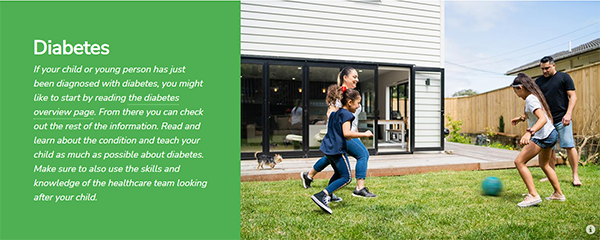Encouraging Children & Young People With Diabetes To Be Active
Encouraging Children & Young People With Diabetes To Be Active
Regular physical activity is important and benefits people of all ages. It includes anything that gets your child/young person moving. It is not necessary to join a gym or buy expensive equipment at home.
Key points about diabetes and physical activity in children
- regular physical activity is important and benefits people of all ages
- it is important to encourage children and young people with diabetes to be active as part of their daily routine
- if your child is using insulin therapy, your local diabetes team can give you advice on safe exercise for your young person
What kind of physical activity is good for my child with diabetes?
Find out how children with type 1 diabetes can exercise safely
Regular physical activity is important and benefits people of all ages. It includes anything that gets your child or young person moving. This could be walking to school, running around the house or playground at school, chasing the dog, organised sports, or even helping with housework! It is not necessary to join a gym or buy expensive equipment at home.
How does physical activity help my child with diabetes?
Physical activity helps to:
- lower blood glucose levels
- improve insulin sensitivity (the ability of insulin to work in the body)
- manage weight within a healthy range
- strengthen muscles, bones and the heart
- increase flexibility and body coordination
- increase energy levels
- improve self-esteem and confidence
- improve general wellbeing
Being active as part of daily routine
It is important to encourage children and young people with diabetes to be active as part of their daily routine. This includes at home, at school and at play. Physical activity should involve the whole whānau for both support and overall health benefits.
Check out the KidsHealth page on the importance of being active in the early years
Insulin therapy and physical activity
If your child is using insulin therapy, your local diabetes team will discuss this with you. They can give advice on all aspects of balancing blood glucose control, insulin dosage, carbohydrate intake and physical activity, in relation to low blood glucose levels. The care plan for certain types of physical activities may be different, and your child will be given personal guidelines regarding exercise.
How can I help my child with diabetes increase their level of physical activity?
Every activity counts!
Maintain a positive attitude to activity
- every activity counts!
- look at activity as an 'opportunity' instead of an inconvenience
- think of fun activities that your child or young person likes doing
Be active as a family
- involve the whole whānau
- be a role model by being active yourself
- limit sedentary activities such as watching TV, playing video or computer games
Walk to places where possible
- avoid driving when walking is possible - walk to the local shop, for instance
- park the car further from your destination
- take the stairs instead of the lifts or escalator
- a step counter may help to motivate your young person and you to make every step count - you can have a competition in the whānau!
Look out for activities your child might enjoy
- look out for activities for your child or young person in community newspapers, or at your local community centre, social clubs and online
- take your young person to the park or beach on a nice day and encourage activities there
- encourage your young person's friends to visit and play
- support and encourage your young person to participate in activities and try out new ones
Check out the Tinana Ora Mо̄ Ngā Tamariki | Physical Wellbeing for Children resource, which helps you and your whānau to track your good habits. It has great ideas on healthy habits you and your whānau can adopt.
Take a look at the New Zealand Spot | Ihi Aotearoa website for more ideas and advice on helping your young person to be active.
See more KidsHealth content on diabetes
This page last reviewed 15 May 2023.
Do you have any feedback for KidsHealth?
If you have any feedback about the KidsHealth website, or have a suggestion for new content, please get in touch with us.
Email us now
